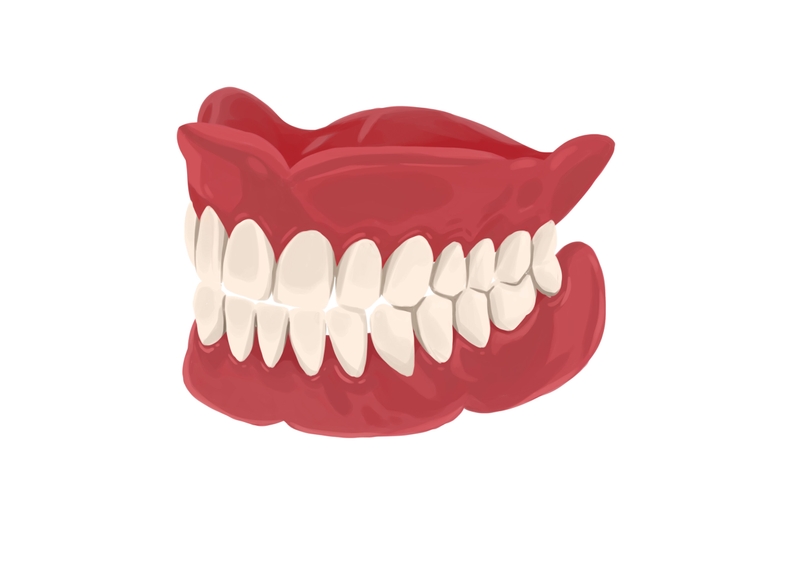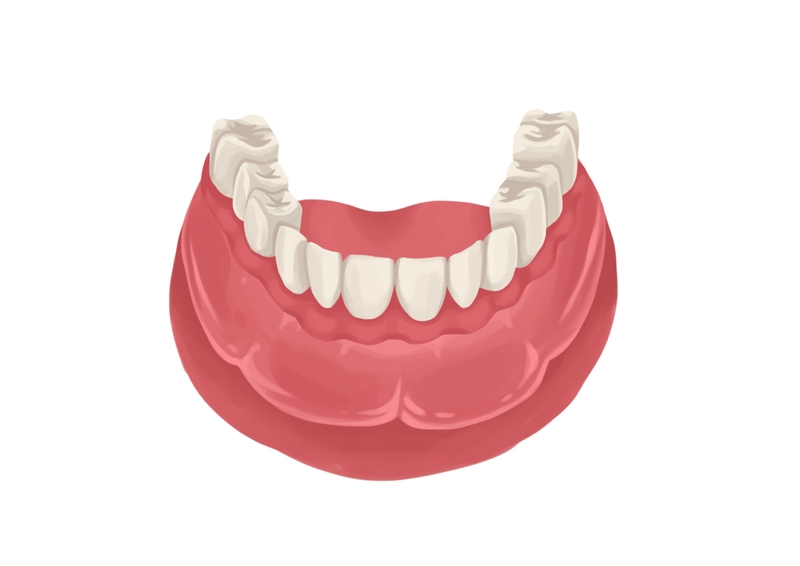- The dental laboratory will create a temporary denture for you based on the impression taken before you have all your remaining teeth removed.
- You can wear them throughout the rest of the extraction procedures and recovery.
- With immediate dentures, you will not have a toothless smile while waiting for your final dentures. They will also give you the opportunity to get used to wearing dentures.
Use Authority Dental to find a budget denture dentist in your city, or get a dental plan and save up to 60% on all dental procedures, including immediate dentures.
Is it a good idea to get immediate dentures? Here's everything you need to know.
Immediate denture procedure

Picture by Authority Dental under CC 2.0 license
The process of getting an immediate denture starts when the natural teeth are still in place. Prior to having them extracted, your dental professional will take an impression of the arch (or both arches if you are having a maxillary and mandibular denture made) as well as bite impressions to show how your teeth come together. As a general rule, dentures are typically produced by a dental laboratory.
A few weeks later, you will return to the office for oral surgery to extract the remaining natural teeth. You can have this done at a general dentist's office or by an oral surgeon.
Immediately following the extractions, your dentist will place the temporary denture in your mouth. You will be instructed to wear the denture as long as you can tolerate it and will typically return the very next day for your first adjustment and a 24-hour check of the extraction sites.
You will have multiple visits during the healing period, and your dentist may place a temporary reline material to help alleviate sore spots on the gum tissues.
Pros and cons of immediate dentures
There are pros and cons to immediate dentures, and it is essential to understand these so that you can make an informed decision when you are ready to begin the transition.
Lee stresses: "I always emphasize that 'immediate' does not mean 'final.' These appliances are like high-quality bandages. Your jawbone and gums shrink dramatically after extractions, especially in the first six months. That perfectly fitted denture on Day One will, by Week Six, become loose."
The most significant advantage of having an immediate denture is that you can have teeth right after the extractions. You do not have to walk around without teeth for several months until the final dentures are made. This is, of course, more aesthetically pleasing. However, immediate dentures also give you something to eat with. Plus, you get to use your immediate dentures to practice with, which will make your transition into traditional dentures much easier.
The downside to having immediate dentures after tooth extractions is that you will need to have a second pair made in the future. This, of course, adds to the cost, and even if you have insurance, the insurance company typically will not cover a new set of dentures within the first five years.
Never go without teeth
Get to practice eating and speaking
Will need to be replaced
Must pay twice
Temporary denture vs conventional ones

Picture by Authority Dental under CC 2.0 license
So, how are temporary dentures different than traditional ones? We have discussed the process of making a temporary denture, so let us review how it differs from a standard denture.
A conventional denture is made months after the extractions and healing period. The jawbone undergoes significant remodeling within the first few months, which is why immediate dentures are intended to be temporary. Once the remodeling is finished (or has at least slowed down), impressions are taken and a final denture can be made. Your denture professional will also take measurements and pictures of your face so that the denture teeth will match your face shape.
A complete denture may also need to be adjusted, but not nearly as much as the temporary ones. A final appliance will last many years if you take proper care of it.
Temporary dentures
Immediate placement
Many adjustments needed during healing process
Temporary solution, replace after 6-8 months
Should last many years with proper care
Traditional Dentures
Wait until 6-8 months after tooth extractions
Few adjustments needed

How much for temporary dentures?
The cost of temporary dentures depends mainly on your location and whether you have insurance or not. Immediate dentures range in price from $1,500 to over $4,000. Many people are surprised to find out that they are typically more expensive than conventional dentures. The reason is that they are more complicated to make and often require multiple adjustment appointments.
If you are fortunate to have dental insurance, many benefit plans cover dentures at about 50%. As we mentioned earlier, there are also replacement periods, and most insurance plans will not cover the cost of replacing dentures sooner than five years.
Please note that additional costs apply for dentures, including X-rays, extractions, and anesthesia. You may also need prescription medications to help with pain after the extractions. If you are getting an implant-retained denture, there will be an additional cost for the dental implants and other required procedures.
FAQ
Who is a good candidate for immediate dentures?
Patients who still have most of their teeth remaining are the best candidates for immediate removable dentures. If any of the natural teeth can be saved, a partial denture might be a better option.
Are traditional dentures thinner than temporary dentures?
Conventional dentures are often thinner than temporary dentures, as they do not require as much adjustment due to initial bone remodeling.
How long do immediate dentures last?
Immediate dentures typically last six to eight months before a new, permanent set must be made.
Harry Lee, DMD
In my practice, immediate dentures are a genuine lifeline. They offer patients the priceless ability to walk out of the office with a full smile, avoiding the psychological and social burden of going toothless during the months-long healing process. This immediate aesthetic benefit is why patients ask for them, and it is a non-negotiable factor for many.